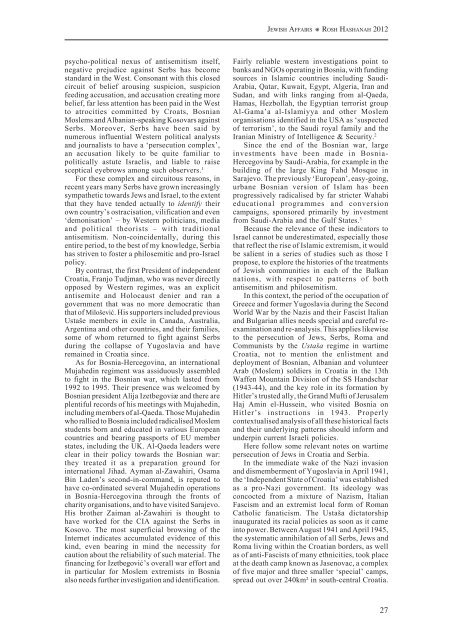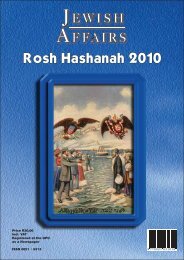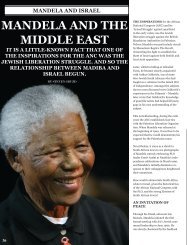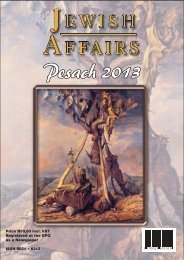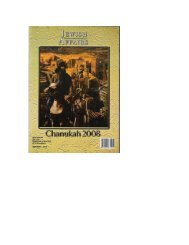Jewish Affairs - South African Jewish Board of Deputies
Jewish Affairs - South African Jewish Board of Deputies
Jewish Affairs - South African Jewish Board of Deputies
- No tags were found...
You also want an ePaper? Increase the reach of your titles
YUMPU automatically turns print PDFs into web optimized ePapers that Google loves.
JEWISH AFFAIRS ROSH HASHANAH 2012psycho-political nexus <strong>of</strong> antisemitism itself,negative prejudice against Serbs has becomestandard in the West. Consonant with this closedcircuit <strong>of</strong> belief arousing suspicion, suspicionfeeding accusation, and accusation creating morebelief, far less attention has been paid in the Westto atrocities committed by Croats, BosnianMoslems and Albanian-speaking Kosovars againstSerbs. Moreover, Serbs have been said bynumerous influential Western political analystsand journalists to have a ‘persecution complex’,an accusation likely to be quite familiar topolitically astute Israelis, and liable to raisesceptical eyebrows among such observers. 1For these complex and circuitous reasons, inrecent years many Serbs have grown increasinglysympathetic towards Jews and Israel, to the extentthat they have tended actually to identify theirown country’s ostracisation, vilification and even‘demonisation’ – by Western politicians, mediaand political theorists – with traditionalantisemitism. Non-coincidentally, during thisentire period, to the best <strong>of</strong> my knowledge, Serbiahas striven to foster a philosemitic and pro-Israelpolicy.By contrast, the first President <strong>of</strong> independentCroatia, Franjo Tudjman, who was never directlyopposed by Western regimes, was an explicitantisemite and Holocaust denier and ran agovernment that was no more democratic thanthat <strong>of</strong> . His supporters included previousUstaše members in exile in Canada, Australia,Argentina and other countries, and their families,some <strong>of</strong> whom returned to fight against Serbsduring the collapse <strong>of</strong> Yugoslavia and haveremained in Croatia since.As for Bosnia-Hercegovina, an internationalMujahedin regiment was assiduously assembledto fight in the Bosnian war, which lasted from1992 to 1995. Their presence was welcomed byBosnian president Alija Izetbegoviæ and there areplentiful records <strong>of</strong> his meetings with Mujahedin,including members <strong>of</strong> al-Qaeda. Those Mujahedinwho rallied to Bosnia included radicalised Moslemstudents born and educated in various Europeancountries and bearing passports <strong>of</strong> EU memberstates, including the UK. Al-Qaeda leaders wereclear in their policy towards the Bosnian war:they treated it as a preparation ground forinternational Jihad. Ayman al-Zawahiri, OsamaBin Laden’s second-in-command, is reputed tohave co-ordinated several Mujahedin operationsin Bosnia-Hercegovina through the fronts <strong>of</strong>charity organisations, and to have visited Sarajevo.His brother Zaiman al-Zawahiri is thought tohave worked for the CIA against the Serbs inKosovo. The most superficial browsing <strong>of</strong> theInternet indicates accumulated evidence <strong>of</strong> thiskind, even bearing in mind the necessity forcaution about the reliability <strong>of</strong> such material. Thefinancing for ’s overall war effort andin particular for Moslem extremists in Bosniaalso needs further investigation and identification.Fairly reliable western investigations point tobanks and NGOs operating in Bosnia, with fundingsources in Islamic countries including Saudi-Arabia, Qatar, Kuwait, Egypt, Algeria, Iran andSudan, and with links ranging from al-Qaeda,Hamas, Hezbollah, the Egyptian terrorist groupAl-Gama’a al-Islamiyya and other Moslemorganisations identified in the USA as ‘suspected<strong>of</strong> terrorism’, to the Saudi royal family and theIranian Ministry <strong>of</strong> Intelligence & Security. 2Since the end <strong>of</strong> the Bosnian war, largeinvestments have been made in Bosnia-Hercegovina by Saudi-Arabia, for example in thebuilding <strong>of</strong> the large King Fahd Mosque inSarajevo. The previously ‘European’, easy-going,urbane Bosnian version <strong>of</strong> Islam has beenprogressively radicalised by far stricter Wahabieducational programmes and conversioncampaigns, sponsored primarily by investmentfrom Saudi-Arabia and the Gulf States. 3Because the relevance <strong>of</strong> these indicators toIsrael cannot be underestimated, especially thosethat reflect the rise <strong>of</strong> Islamic extremism, it wouldbe salient in a series <strong>of</strong> studies such as those Ipropose, to explore the histories <strong>of</strong> the treatments<strong>of</strong> <strong>Jewish</strong> communities in each <strong>of</strong> the Balkannations, with respect to patterns <strong>of</strong> bothantisemitism and philosemitism.In this context, the period <strong>of</strong> the occupation <strong>of</strong>Greece and former Yugoslavia during the SecondWorld War by the Nazis and their Fascist Italianand Bulgarian allies needs special and careful reexaminationand re-analysis. This applies likewiseto the persecution <strong>of</strong> Jews, Serbs, Roma andCommunists by the Ustaša regime in wartimeCroatia, not to mention the enlistment anddeployment <strong>of</strong> Bosnian, Albanian and volunteerArab (Moslem) soldiers in Croatia in the 13thWaffen Mountain Division <strong>of</strong> the SS Handschar(1943-44), and the key role in its formation byHitler’s trusted ally, the Grand Mufti <strong>of</strong> JerusalemHaj Amin el-Hussein, who visited Bosnia onHitler’s instructions in 1943. Properlycontextualised analysis <strong>of</strong> all these historical factsand their underlying patterns should inform andunderpin current Israeli policies.Here follow some relevant notes on wartimepersecution <strong>of</strong> Jews in Croatia and Serbia.In the immediate wake <strong>of</strong> the Nazi invasionand dismemberment <strong>of</strong> Yugoslavia in April 1941,the ‘Independent State <strong>of</strong> Croatia’ was establishedas a pro-Nazi government. Its ideology wasconcocted from a mixture <strong>of</strong> Nazism, ItalianFascism and an extremist local form <strong>of</strong> RomanCatholic fanaticism. The Ustaša dictatorshipinaugurated its racial policies as soon as it cameinto power. Between August 1941 and April 1945,the systematic annihilation <strong>of</strong> all Serbs, Jews andRoma living within the Croatian borders, as wellas <strong>of</strong> anti-Fascists <strong>of</strong> many ethnicities, took placeat the death camp known as Jasenovac, a complex<strong>of</strong> five major and three smaller ‘special’ camps,spread out over 240km² in south-central Croatia.27


